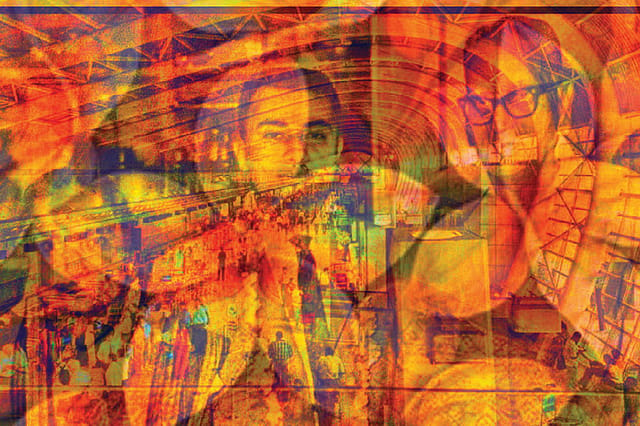A Satsang at the Gate

THE AIRPORT IS already a wound, isn't it? A place of waiting and wanting, of arrivals that feel like absolution and departures that taste of death. And here I am, too early for a flight, after a weekend that broke me further than I thought a soul could break. The suffering of this weekend was sharper, stranger, a savage symphony in a minor key, and I found myself unable to sit still, unable to collapse into silence, unable even to dissolve into a book or my own writing.
So I walked. At first hesitantly, then hungrily, as though moving might burn away the heaviness. I hummed a little tune to myself. Soon I was singing—softly at first, then loud enough to earn sharp looks from fellow passengers, eyes that darted like daggers but did nothing to deter me.
And then the line came—the line that had always lived inside me, a line from the satsang we once sang in memory of my grandfather on his birth and death anniversary, a line that felt
like both confession and cure. "Main hoon beemaar, mere dard ka nahi koi ilaaj, mere dil zakhm ka marham teri boli hai ilaaj. (I am ill, yes, but not of the kind that medicines mend. The wound in my heart can only heal with the balm of your voice, your gentle utterances, your familiar cadence that carries my name like a prayer)."
Openomics 2026: Continuity and Conviction
06 Feb 2026 - Vol 04 | Issue 57
The performance state at its peak
I thought then of my grandfather, a quiet man of quiet faith, who belonged to the Radha-Swami tradition—a spiritual path that began in Swamibhag, Agra, long before its name became known across Punjab and beyond. Our satsangs were simple, private, intimate affairs, held at home without fanfare or noise, never open to the curious or casual. Those who came were few—rarely more than a dozen—and they came because they cared, because they understood that these gatherings were about something deeper than ritual: about feeling the heft of words, the depth of our shared humanity, the quiet connections of dreams and emotions that link us all.
I did not have much time with my grandfather. But my father carried that current beautifully, keeping alive the Radha-Swami faith's essence in our minds, our bodies, our spirits by convening those satsangs: simple, succinct, profoundly deep.
The words came from the Guru's books, passed hand to hand like fragile truths, written in a Hindustani so hauntingly beautiful it seemed to carry the very breath of God—Hindi and Sanskrit braided with Persian, even a stray English word here and there like a glint of foreign light.
Even now, alone among strangers in an airport that smells of floor polish and loss, I can feel him here, his presence a faint fragrance of sandalwood and wisdom, walking these corridors of my loneliness, keeping pace with my pain. His voice was gone but his boli remained—his rhythm, his rhyme, his quiet insistence that no pain is permanent if you learn to sing through it. And so I kept singing, even as passengers turned away, even as announcements crackled above me.
For what is a nuisance if not proof that one is still alive, still capable of song, still capable of seeking out the marham hidden in a memory? Pain may be endless, but so is the refrain, and sometimes that is enough. I walked, and each line was a lantern: "Jo kuchh diya, wahi banega roshni. (Whatever He gave will one day shine)."
So I sit now at the gate, still early, still aching, but somehow less alone, because I know his words are still here, waiting in the wings of my own voice, reminding me that even in the most excruciating emptiness, we are never entirely without medicine, never entirely without melody. Pain may be endless, but so is song. And sometimes, as he taught me, that is enough. That is all. That is everything.
